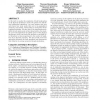Free Online Productivity Tools
i2Speak
i2Symbol
i2OCR
iTex2Img
iWeb2Print
iWeb2Shot
i2Type
iPdf2Split
iPdf2Merge
i2Bopomofo
i2Arabic
i2Style
i2Image
i2PDF
iLatex2Rtf
Sci2ools
112
Voted
DIALM
2008
ACM
2008
ACM
Local broadcasting in the physical interference model
In this work we analyze the complexity of local broadcasting in the physical interference model. We present two distributed randomized algorithms: one that assumes that each node knows how many nodes there are in its geographical proximity, and another, which makes no assumptions about topology knowledge. We show that, if the transmission probability of each node meets certain characteristics, the analysis can be decoupled from the global nature of the physical interference model, and each node performs a successful local broadcast in time proportional to the number of neighbors in its physical proximity. We also provide worst-case optimality guarantees for both algorithms and demonstrate their behavior in average scenarios through simulations. Categories and Subject Descriptors F.2.2 [Analysis of Algorithms and Problem Complexity]: Nonnumerical Algorithms and Problems--Geometrical Problems and Computations, Sequencing and Scheduling General Terms Algorithms, Theory.
Related Content
| Added | 19 Oct 2010 |
| Updated | 19 Oct 2010 |
| Type | Conference |
| Year | 2008 |
| Where | DIALM |
| Authors | Olga Goussevskaia, Thomas Moscibroda, Roger Wattenhofer |
Comments (0)

